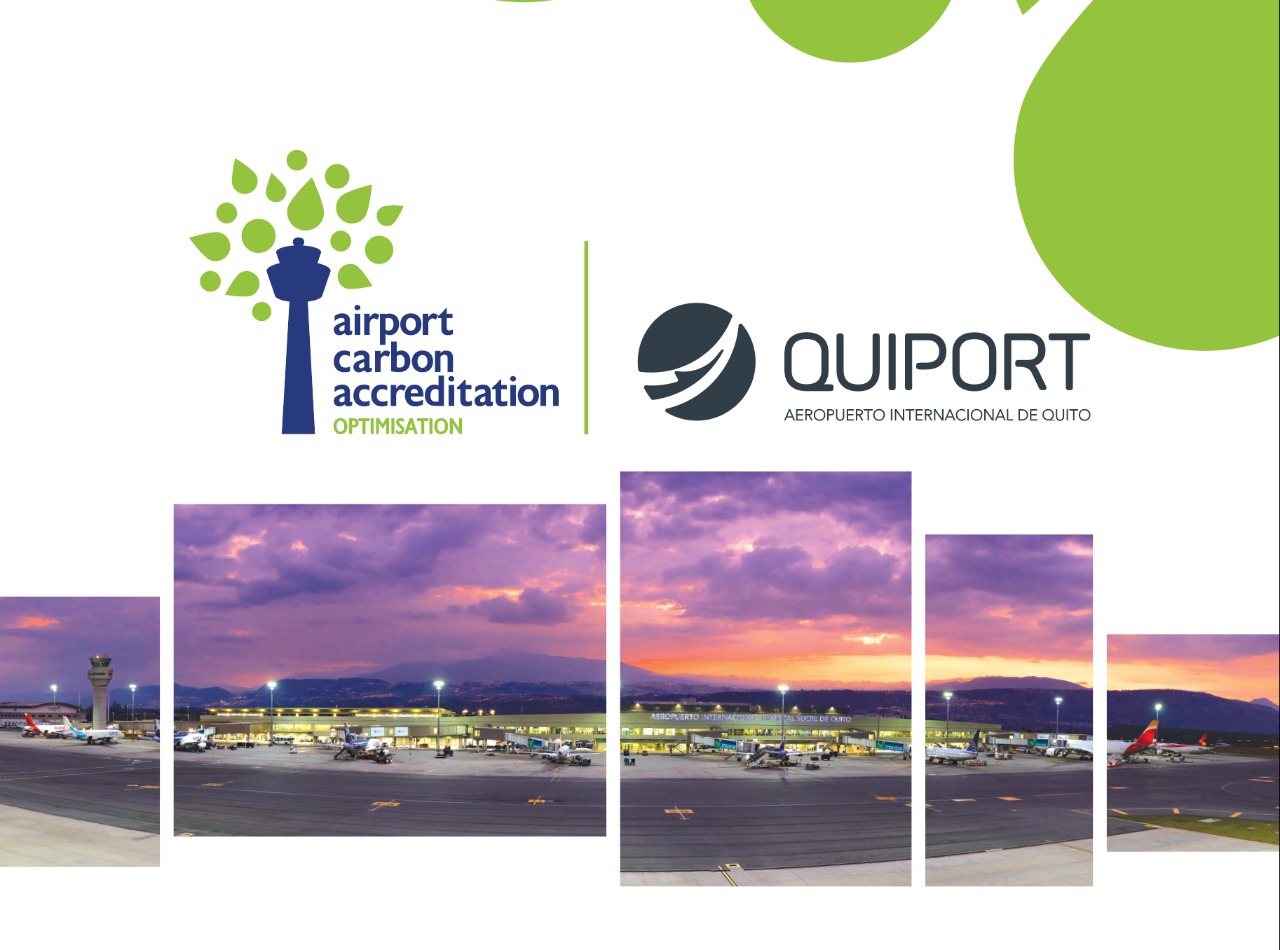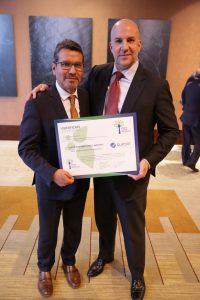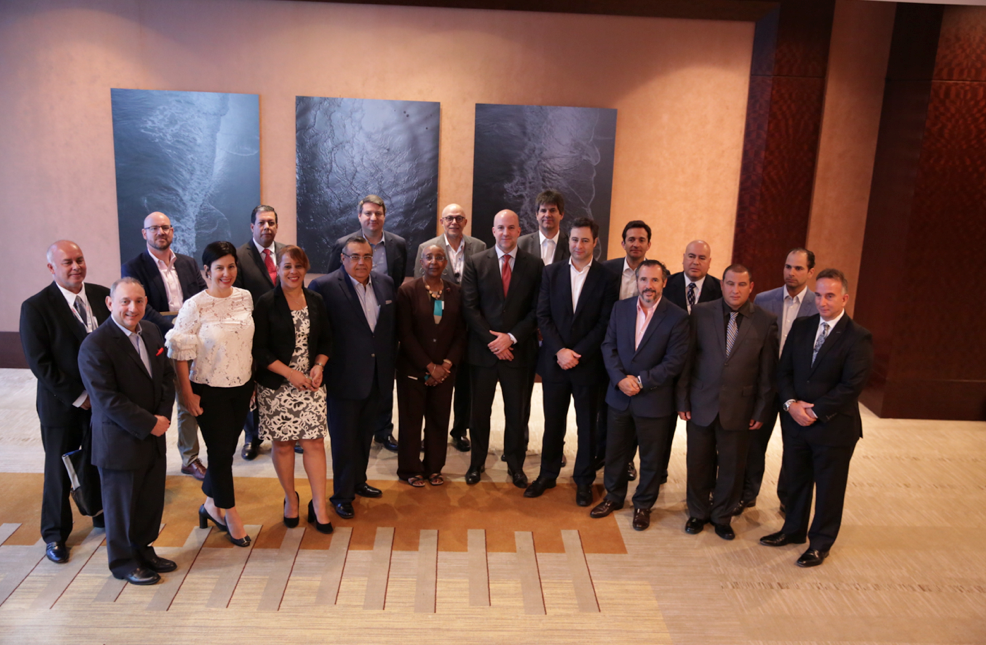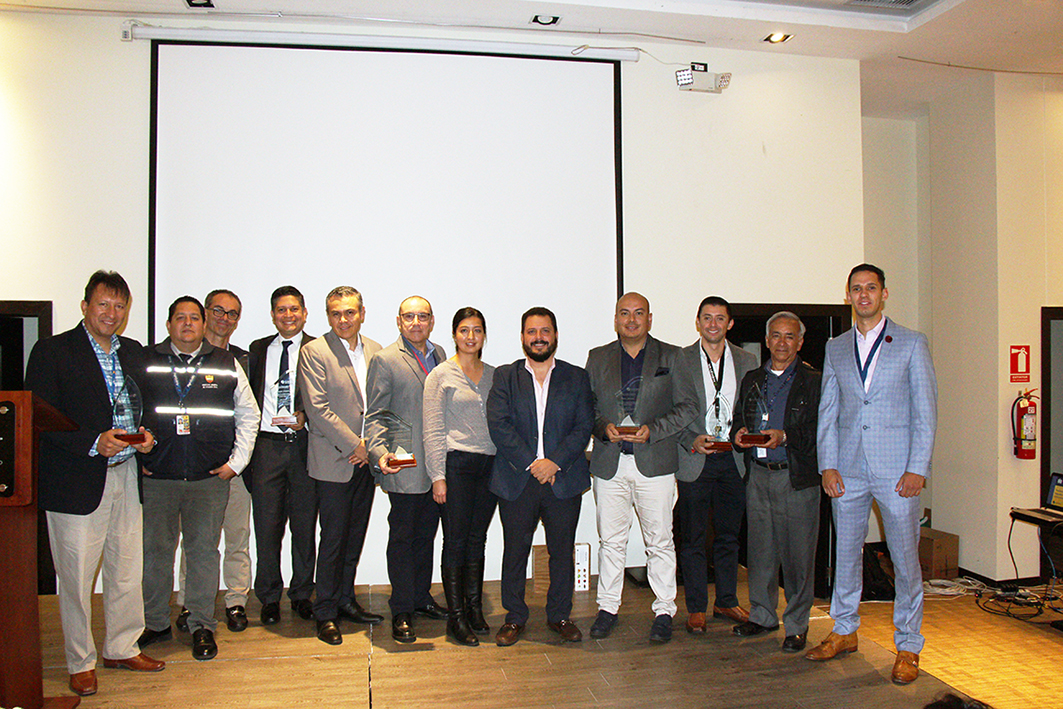Month: November 2018
QUITO AIRPORT CELEBRATES ITS 30 MILLIONTH PASSENGER

- This number has been reached 5 years and 9 months after the airport opened in February 2013.
- The 30 millionth passenger is Ecuadorian and was returning to Quito from Guayaquil.
We have now seen 30 million passengers pass through Mariscal Sucre Airport since it began operations on February 20, 2013. This afternoon, on Avianca flight 1633 which landed at 14:30 from Guayaquil, we received our 30 millionth passenger, Ximena Zamora.

She arrived amid much fanfare and was the key guest at a celebration held in her honor, where Corporación Quiport gifted her a membership to the airport’s VIP Experience (access to VIP Lounges and fast track service) as well as a box with products from our Nuestra Huerta community project, one of Corporación Quiport’s main corporate social responsibility programs.
Allan Padilla, Director of Operations at Quiport, congratulated the lucky passenger and gave her a certificate to remember this special occasion.
Ximena Zamora was surprised to find out she was our 30 millionth passenger. “It is an honor to be part of this celebration and it has been a very pleasant surprise. It is good to see the airport is well-managed, you are an example for Latin America and the world” she said while thanking Quiport for the surprise.
Allan Padilla declared “we are proud that after nearly six years of operations we now celebrate our 30 millionth passenger at Quito Airport, which has been recognized as South America’s Leading Airport for a fifth time and as a 4-Star airport for the third consecutive time by Skytrax”.
He also mentioned that thanks to the growth in passenger traffic seen at the airport, new expansion works and improvements are being carried out to provide a service that exceeds the expectations of our users and passengers at Quito Mariscal Sucre International Airport.

ECUADOR’S FIRST ECOLOGICAL CLUSTER IS ESTABLISHED IN TABABELA

- Some 15 private companies connected to the aviation industry have pooled their environmental management experiences and commitments to create the first cluster to optimize their processes. Their aim is to reduce their carbon footprint and consolidate a sector that grows while respecting the planet. These efforts have been recognized by Airports Council International (ACI) which awarded Level III Optimization certification to Mariscal Sucre International Airport, Quito (MSIA) for promoting this initiative.
Improve aircraft operating procedures, gradually replace conventional lighting with LED technology, use the least amount of packaging in export cargo processes, make use of recyclable materials, construct and operate wastewater treatment plants; all of these are among the commitments agreed by 15 private companies and Corporación Quiport, the entity that manages the capital’s airport and which last week was awarded Level III Certification of the Airport Carbon Accreditation program by Airports Council International.

“Our commitment to Quito and Ecuador is to offer an airport with efficient operations and sustainable development. The magnitude of climate change is such that individual actions to mitigate impacts must be expanded to include far-reaching movements to achieve a notable influence” says Andrew O’ Brian, President and CEO of Corporación Quiport. “To achieve this goal, the airport and the 15 companies that have joined the shared purpose will invest approximately USD 500,000 to be used to perform specific commitments” he explains.
According to ACI Latin America, 16 airports are part of its Airport Carbon Accreditation program. Of these, Mariscal Sucre Airport is the second after the Galapagos to obtain Level III Optimisation which involves including other industry stakeholders in efforts to reduce CO2 emissions. The first cluster (group of interconnected companies in a particular industrial sector who collaborate strategically to obtain common benefits) has been created around the airport with the aim of developing joint and powerful actions to halt climate change.
To obtain this recognition, MSIA first passed Level I which required carbon footprint measurement and Level II which is focused on reduction. The goal now is to reach Level IV – Neutrality which requires neutralizing remaining direct carbon emissions by offsetting.
According to Quiport’s data, during Level III certification, the Airport’s carbon footprint has been reduced by 4%, meaning that in the past year 819 tons of emissions have been saved.
The specific commitments of the members of the cluster are varied. For example, LATAM and Tame will work to improve their aircrafts’ operating procedures and route monitoring systems. Avianca has agreed to gradually replace its lighting with LED technology. Servipallet (air cargo pallet service), Petroamazonas Hangar, Swissport EMSA, Meramexair, DK Terra and Pertral (pallet services) have also set themselves this objective.
Goddard Catering Group, in charge of preparing on-board meals, has set a goal to build and operate a wastewater treatment plant and KFC Group will continue its campaign to reduce plastic and encourage proper waste management. Hotel Wyndham aims to use solar panels to provide hot water at its facilities and Novacargo will install motion sensor lights in it its service areas.
This way, the region’s best airport is paying attention to global changes and offers innovative solutions to help improve the quality of life of Quito’s residents and Ecuadorians.
ANDREW O’BRIAN ELECTED PRESIDENT OF AIRPORTS COUNCIL

- Andrew O´Brian’s election took place at the 27th Annual Assembly of the Airports Council International – Latin America and the Caribbean.
- This is a new show of Quito’s and its airport’s leadership and the trust placed in Corporación Quiport´s work.
- ACI-LAC represents 270 airports from Latin America and the Caribbean that transport 584 million passengers per year and 5.1 million metric tons of cargo.
At midday on November 13, the members of the ACI-LAC General Assembly unanimously voted to elect Andrew O’Brian, President and CEO of Corporación Quiport, as President of the organization for a two-year term.
Corporación Quiport is honored with the appointment of Mr. O’Brian as President of this important body, representing the interests of more than 270 airports in the Latin American and Caribbean region that together mobilize 584 million passengers annually and handle 5.1 million metric tons of cargo.
In his speech, Andrew O’Brian expressed his enthusiasm to start working with the new Board of Directors that has been formed for the 2019-2020 period, in which the CEOs of 17 regional airports participate, who will lead the organization by the next two years with a strategic vision to strengthen the positioning of the Latin American and Caribbean region as one of the most potential for development on a global scale
“The experience I have gained over my time at ACI-LAC has shown me the importance of having a very solid association of airports that can handle the challenges we face in the industry”, stated Mr. O’Brian, who also invited the representatives of the airports participating in the Assembly to work together to help the organization and the Latin American and Caribbean airport sector reach new heights.
The ACI-LAC 27th Assembly, Conference and Commercial Exhibition, attended by approximately 350 delegates from airports across the region, is being held in Miami, USA from 12 – 14 November.
This gathering is the ideal platform for fostering relationships with leaders and decision makers from airport operators, government and service providers, among other industry stakeholders.
The Airports Council International was founded in 1991 by airport operators across the globe. Its mission is to advance the collective interests of the air transport industry and maximize cooperation between its members.
QUITO AIRPORT CELEBRATES 2018 OPERATIONAL SAFETY WEEK

For purposes of promoting operational safety at the Quito International Airport, Corporacion Quiport – the city’s concessionaire of airport services – organized the seventh Operational Safety Week 2018 at the Mariscal Sucre International Airport.
The symposium was held from Wednesday, November 7, to Friday, November 9, at the Wyndham Quito Airport Hotel. More than 500 members of the Quito airport community attended the meeting to discuss transcendental issues in respect of operational safety and to reflect on best practices relating to every aspect of airport operations.
Important members of Ecuador’s aeronautical industry were present such as Carlos Alvarez-Mantilla, Director General of the Civil Aviation Directorate (“DGAC”), Octavio Perez, Tame’s General Manager, Javier Villalba, Safety Chief for LATAM Ecuador, Allan Padilla, Director of Operations for the Quito Airport, among others.
During his speech at the inauguration ceremony, Carlos Alvarez-Mantilla -the highest aeronautical authority- highlighted operational safety as the backbone of civil aviation, while Mr. Padilla stressed the importance that all companies, workers and institutions operating at the airport should participate in these learning processes, exchange best practices, and reflect about this subject matter.
The 2018 Operational Safety Week was successfully organized with ACI-LAC support (the Airport Council International – Latin America and the Caribbean), an organization that gathers 270 airports in the region.
Among the important activities that took place during the three days are “Lessons about Operational Safety” roundtable with a panel including representatives from the airlines that operate in Quito, ramp services operators, and airport suppliers. Experts in operational safety from the Mexican Pacific Airport Group were present in a video-conference on “Human Factors at Airports” and a speech about fatigue affecting workers and shift work delivered by a doctor who is a specialist in labor issues.
Aviation is one of the safest transportation means, in great measure thanks to the careful and responsible work on operational safety implemented by airport operators, suppliers of ancillary services, and the airports. Continued positive work at the Quito Mariscal Sucre Airport in these aspects is strengthened by events such as this, the interest shown by the airport community, and permanent application of best practices.
Given the importance and success of this initiative, ACI-LAC is planning to repeat this event in other affiliated airports in the region.
